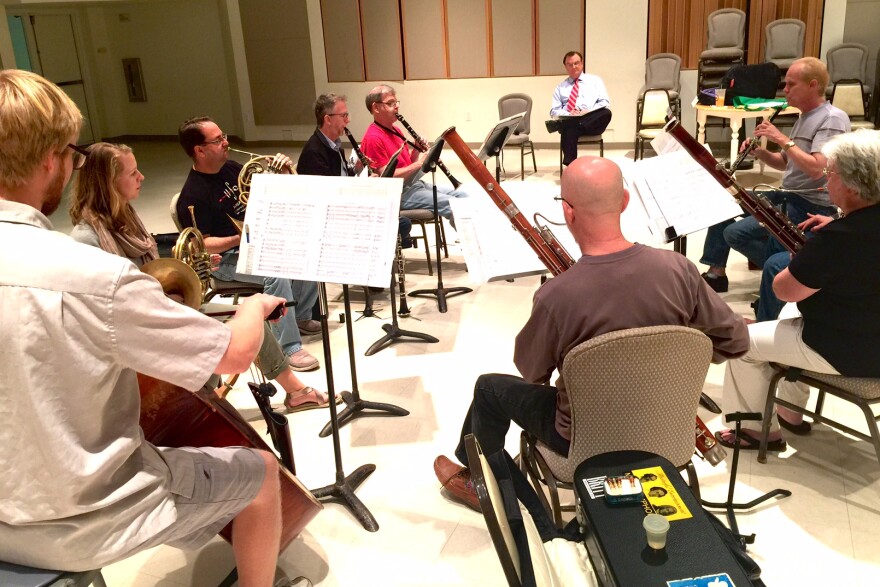Setting the record straight matters to some people, like Honolulu newscaster Joe Moore. Moore, a well-known Mozart aficionado, has been tracking the true story of Antonio Salieri, depicted as Mozart’s nemesis in a popular film about Mozart’s life. In the process, Moore uncovered a treasure trove of music, now brought back to life in two special concerts featuring the Spring Wind Octet. HPR’s Noe Tanigawa reports.

Chamber Music Hawai‘i presents “MALIGNED MASTER: Setting the Record Straight on Salieri” with the Spring Wind Octet and commentary by Joe Moore.
Sunday, February 12, 4pm, at the Doris DukeTheatre
Monday, February 13, 7:30pm, at the Palik? Theatre in K?ne‘ohe
Tickets are available online or at the door. Students with a current ID are always free at Chamber Music Hawai‘i concerts. If you go and do not enjoy yourself, Joe Moore is offering a refund. Simply mail your ticket stubs to him at KHON for reimbursement.
Did you know newscaster Joe Moore had his own Mozart music program on Hawai‘i Public Radio for five years? Here at a rehearsal between newscasts, Moore said his fascination with the master started by accident on a date.
“So we’re walking across campus on Saturday and she kinda turns what I thought was the wrong way, and I said, Where you going? She says, over to the rehearsal hall, and I said What are you talking about, it’s in Cole Field House, Frankie Valli and the Four Seasons? She said, No, We’re going to a Mozart concert. That was my first exposure, my freshman year in college. But I was sitting there and as I was listening to it, I got hooked.”

Ingenuity, profound emotion, playfulness, Mozart’s music is a magnet as portrayed in the movie, “Amadeus.” What has always bothered Moore, however, is the depiction of Mozart’s so-called rival, Antonio Salieri, who was actually more of a mentor and quite possibly more popular in the day.
“Mozart died at the age of 35, Salieri lived into his seventies and was still working but had withdrawn from composing operas because musical taste was changing and it was getting more into a romanticism period and Salieri just didn’t believe in that. He wanted to stay in the Classical form. But he had composed 42 operas, many of those, were what today we would call smash hits. And Mozart’s operas, Mozart had 26, but in the ten years they’re both in Vienna, if you look at box office attendance and receipts, Salieri’s operas were more popular, received better critical reviews as well from just your average music person of that time. Salieri was held in much higher esteem than Mozart. That’s something you would never get if all you know about Salieri is what you got in "Amadeus." There was no antagonism at all between these two composers.”
In fact, we get a rich picture of the late 1700’s in Europe by enjoying them both. Johann Wendt arranged many of Mozart’s operas for wind band and he did the same for a Salieri opera we will hear.
“Wendt arranged many of Mozart’s operas, he arranged them for wind band and he arranged this Salieri opera for wind band. This is Wendt’s original wind arrangement that has been in the Esterhazy library in Vienna for over 230 years. I was able to talk with those folks and get the parts for this piece and this will actually be a United States premiere. This wind arrangement has never been performed in the United States before, so it’s a pretty special deal. “
Janusch: “One of the exciting things about music of this era, it was something Salieri did and it was common performance practice. There’ll be times in the music where it appears to stop, and this is where I wanted to get a little into the eingang.”
HSO principal clarinetist Scott Janusch says Mozart is credited with naming this little musical bridge, the eingang, that generally leads into a refrain. Jazz style, it’s an improvised moment.
“Salieri was very creative and I think the audience will all enjoy hearing the way he used instruments in different ways.”
Bassoonist Marsha Schweitzer: “For every composer that becomes well known or well recognized, there are a hundred or a thousand others, contemporaries, who are basically lost to history. It’s great music, it’s just that composer didn’t push the button that the famous composers pushed that got them famous. Well, let’s see, maybe after this concert that we’re doing, Salieri’s music will have a renaissance.”
Moore: “The highlight of the concert for me is going to be La Grotta di Trifonio. There’s going to be six movements that they play that have never been performed in the United States before. This is really, truly a U.S. premiere and we get to do it in Hawai‘i.”
“I’m gonna have a great time and I think people will. There’s a lot of neat stuff they don’t know about Salieri and his music I think people will really enjoy.”
Moore is so sure about this, he’s offering your money back if you go and aren’t wowed. Remember, with a student ID, Chamber Music Hawai‘i concerts are always free.




